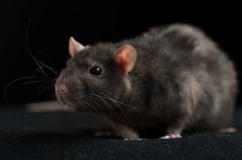RODENT
Rodents are highly adaptable animals they are commonly found near human dwellings and are most likely to benefit from human structures, food and waste. Rats and mice pose an issue for humans living within the same vicinity for a number of reasons. Rats cause a lot of damage. As the teeth of rodents continue to grow over their lifetime, they need to gnaw on hard substances such as lead and plastic pipes, insulation material and electric wiring. This habit increases the risk of short circuits and fires. In addition to this, they transmit a number of dangerous diseases such as Salmonella, Leptospirosis (Weil’s disease), Tuberculosis and even tape worms.
Rats and mice are also successful breeders. A female rat can reproduce every three weeks, and usually gives birth to about six to 10 young at one time. A female mouse reproduces every three to four weeks and usually gives birth to about five or six young, although sometimes up to 12. This means that both rat and mice colonies can grow large quickly, although rats only live for about a year. Mice can live up to two or three years under ideal conditions.
Rats cause a lot of contamination. One single rat equals more than 24000 droppings per year, which contain allergens that can cause acute allergic reactions. Rats introduce secondary pests. Rats are also known to introduce other pests, such as fleas, mites and ticks into the premise, causing additional damage.

JV Care's Rodent Control Program includes
➢ Thorough inspection to identify rodent entry points.
➢ Exclusive three line defence methods for rodent management.
➢ We use high quality glue pad which includes attract lure in the glues.
➢ Proprietary trapping and baiting systems for interior and exterior locations.
➢ Discreet rodent stations deliver protection without alarming customers.
➢ Rodenticide-free devices lower environmental impact.
➢ Ongoing consultations help prevent infestation.
RODENT FACTS
➢ Almost 50 percent of the mammal species in the world are Rodentand
➢ Rats contaminate and destroy enough food worldwide each year to feed 200 million people
➢ Mice and rats can spread at least 35 diseases to humans, according to the CDC. These diseases include salmonellosis, Hantavirus, and rat-bite fever. The infections may be spread through droppings, urine, saliva, rodent bites, or through fleas or ticks that have fed on an infected rodent (like the bubonic plague!).
➢ Rodent teeth never stop growing! One of the defining characteristics of a rodent is a set of teeth that continuously grow over their lifetime. Rodents always need something to gnaw on to keep their incisors trimmed, so that’s why they can cause so much damage.
➢ A female rat can produce over 100 young each year and a female house mouse can produce almost 150 young in one year
➢ The fear of mice and rats is scientifically called “musophobia,” from the Latin word “mus,” meaning “mouse.” It is also known as “murophobia,” from the word “murine.” This word comes from “Muridae,” the scientific term for the family of animals that includes mice and rats.
➢ Rats can squeeze through openings as small as 13 mm in diameter— about half an inch!
➢ Because they can get fluids from foods, many rodents can survive a long time without drinking water.
➢ Rats are among the smartest animals on the planet, often ranked in the company of dolphins and chimpanzees!
RODENT PREVENTION TIPS:
➢ Seal holes and gaps on the exterior and interior of the facility like pipeline and cable gaps
➢ Seal all doors, inspect and repair entrances on a regular basis
➢ Seal potential access to hidden runways and harbourages
➢ Trim trees so that no branches are touching the facility
➢ Eliminate food spillage of garbage
➢ Remove weeds, tall grass and other excessive vegetation
➢ Consider other sources of rodent pressure (adjoining structures, distribution centre, product vendors, etc.) and carefully inspect incoming goods for the presence these pests
➢ If present, remove all rodent droppings to avoid food contamination
➢ Deny Food, Water and Shelter
➢ Eliminate all moisture sites, including leaking pipes and clogged drains that
provide the perfect breeding site for pests.
➢ Call JV care pest professional for additional advice and treatment if necessary
